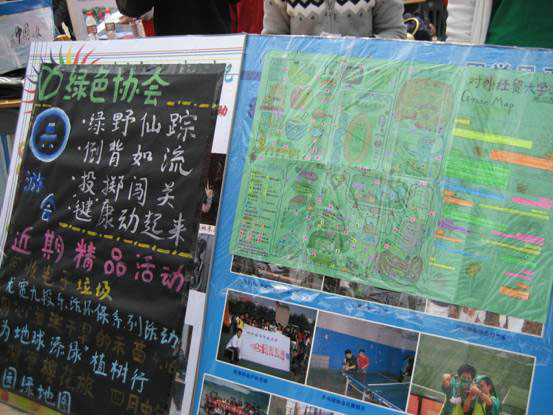
Green Association of University of International Business and Economics exhibits a poster promoting green activities and a painted Green Map, which denotes environmental protection facilities on the campus at the opening ceremony of the university's 13th Community Cultural Festival, in Beijing, April 8, 2010. [chinadaily.com.cn]
BEIJING: They were dressed in green uniforms. Their poster took green as its background color. The distinctive green "corner" at the 13th Community Cultural Festival at the University of International Business and Economics (UIBE), opened on April 8, was really eye-catching.
The Green Association of UIBE, which was founded in 1998 and now has about 150 student members, has helped the university become a positive example of energy saving and carbon footprint reduction.
"The group has played an important role in promoting the green concept on the campus. Only by doing this can we consolidate the fame we've earned in environment protection," Chen Jianxiang, a vice-president at UIBE, said at the opening ceremony of the annual campus festival.
The finely painted "Green Map", which locates all the environmental protection facilities across the campus, was just one indication.
Ma Lan, president of the Green Association, seemed very proud of the green efforts they had made.
"We have a 'waste paper for gifts' program, which is aimed at encouraging students to recycle scrap paper. We do it every month," she said. "They send waste paper to the designated points. We give them small gifts as a reward. The move has been a tradition for years and is much welcomed by the students."
The collected used paper is in turn delivered to a paper recycling company.
The move has developed into a joint action of several universities in the capital, including Peking University and College of Foreign Affairs, according to Ma.
Yellow and green battery collection boxes are also familiar sights on the campus.
"You could find these boxes in all the dormitory buildings and teaching buildings. Every time we open the boxes, we could see many waste batteries and have a feeling of achievement," the senior college student said with a smile.
Used batteries are considered one of the sources of groundwater pollution. It could pose a deadly health threat to people if disposed inappropriately.
To further improve the students' environment knowledge, the campus community employs a "flying messaging service" to send students text messages with eco-friendly themes.
"On one hand, it's a way to popularize the low carbon tips in our daily life. On the other hand, it's a paperless and economical way to do it," Ma explained.
As part of the one-month community cultural festival, the student group is launching a water-saving campaign throughout this week. The weeklong event is in response to the ongoing dry spell in China's southwestern region.
"It's a good opportunity to educate students to save every drop of water," she said. "Just imagine life in the drought-affected regions. You'll feel ashamed if you still waste water."
In response to the nationwide call of a low-carbon lifestyle, going green has become a new trend on campus as universities and colleges are big energy consumers. And those efforts have paid off in a big way.
Students' eco-awareness has been greatly increased.
Take the use of plastic bags, for example. One of Ma's roommates was chided for using a plastic bag after shopping at a supermarket.
"It's a totally different story from the past. No free use is of course one part of the reason. But if one can persuade others not to do something, it means he or she is really concerned about it," Ma said.
On the financial side, the measures UIBE has taken to help fight climate change, ranging from the use of solar street lamps, solar heating system in its water rooms, energy-efficient air conditioning system in its library to a newly developed water recycling system, has helped the university save 25 million yuan in energy costs in the past year, according to Xinhua.
The water recycling system, which was designed to reclaim rain water, snow water and waste water collected from bathrooms and reuse the water in flushing the toilets and watering the gardens and lawns, saved 500,000 yuan in two years.
Not only do they do their part on campus, college students also go out to promote green ideas on the streets and in the residential communities.
Ma's association, together with Peking University's counterpart, conducted a poll of electricity consumption in a residential neighborhood last year and found the result was unsatisfactory.
"We just want to remind people to adopt an energy-saving lifestyle, making Earth Hour not only a gesture but a daily activity that could benefit the environment we live in a practical way," she said.
Earth Hour, a worldwide campaign aimed at promoting energy saving and emission reduction, saw lights in about 4,000 cities around the world go out on March 27 this year.(Cai Shanshan/Chinadaily.com.cn)


